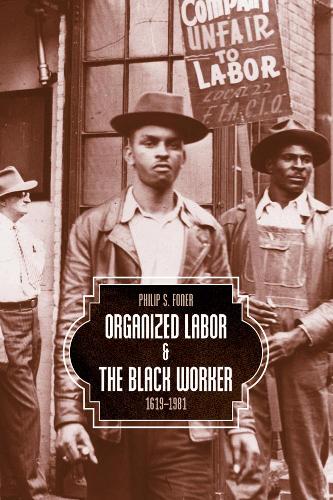
Organized Labor And The Black Worker: 1619-1981
(Paperback)
Publishing Details
Organized Labor And The Black Worker: 1619-1981
By (Author) Philip S. Foner
Foreword by Robin D. G. Kelley
Haymarket Books
Haymarket Books
2nd January 2018
United States
Classifications
General
Non Fiction
Social and cultural history
Industrial relations, occupational health and safety
History of the Americas
331.6396073
Physical Properties
Paperback
492
Width 142mm, Height 217mm
Description
In this classic account, historian Philip Foner traces the radical history of Black workers contribution to the American labor movement.
Reviews
"Foner's careful and detailed scholarship makes this the best one-volume study of blacks and the labor movement currently available." The Black Scholar "The standard of accuracy and reasoned argument maintained in this work should make it the standard on its subject for a long time." Professor Davivd Herreshoff, Journal of American History "This readable and authoritative work represents a significant contribution to the literature of black unionism in the United States." Joel Hettger, U.S. Department of Labor History, Library Journal "Foner's book provides considerable illumination of the an important and often overlooked aspect of American labor history." Professor Norman Lederer, American Academy of Political and Social Science. Simply the best treatment of the history of the black worker yet to appear and is likely to be the standard work in the field for a long time to come. William K. Tabb, Review, Review of Black Political Economy "Organized Labor and the Black Worker documents a very long history of trade union and white working-class intransigence to Black working-class advancement alongside episodes of interracial class unity and the elusive promise of a radical future. His book is filled with anecdotes of working-class racism undermining genuine workers power in favor of the paltry protections of white privilegefrom the erection of occupational color bars by unions to the outbreaks of wildcat strikes against the hiring of black workers. But it is also peppered with episodes of anti-racism and interracial unity, from the Knights of Labor and the Industrial Workers of the World (IWW) to the Congress of Industrial Organizations (CIO). Foner reminds us that African Americans provided leadership to white workersor at least they tried. From the Colored National Labor Union to the Brotherhood of Sleeping Car Porters, from the League of Revolutionary Black Workers to the Coalition of Black Trade Unions, Black labor militants appealed to whites and other workers of color for solidarity. Indeed, solidarity is the books central message; when white workers attempt to go it alone or build exclusionary racist unions, they dont win. A stunning achievement; it still stands as the most comprehensive treatment to date of African American workers and the labor movement. Robin D. G. Kelley, from the Foreword
Author Bio
Philip S. Foner (1910-1994) was an American historian and professor who taught and lectured all over the world. He wrote and edited more than a hundred books, including the ten-volume History of the Labor Movement in the United States and The Black Panthers Speak. Robin D. G. Kelley isProfessor and Gary B. Nash Endowed Chair in U.S. History at UCLA. He is the author ofHammer and Hoe, Race Rebels,Freedom Dreams: The Black Radical Imagination, andThelonious Monk: The Life and Times of an American Original, among other titles. His writing has been featured in theJournal of American History, American Historical Review, Black Music Research Journal, African Studies Review, New York Times, The Crisis, The Nation,andVoiceLiterary Supplement.
